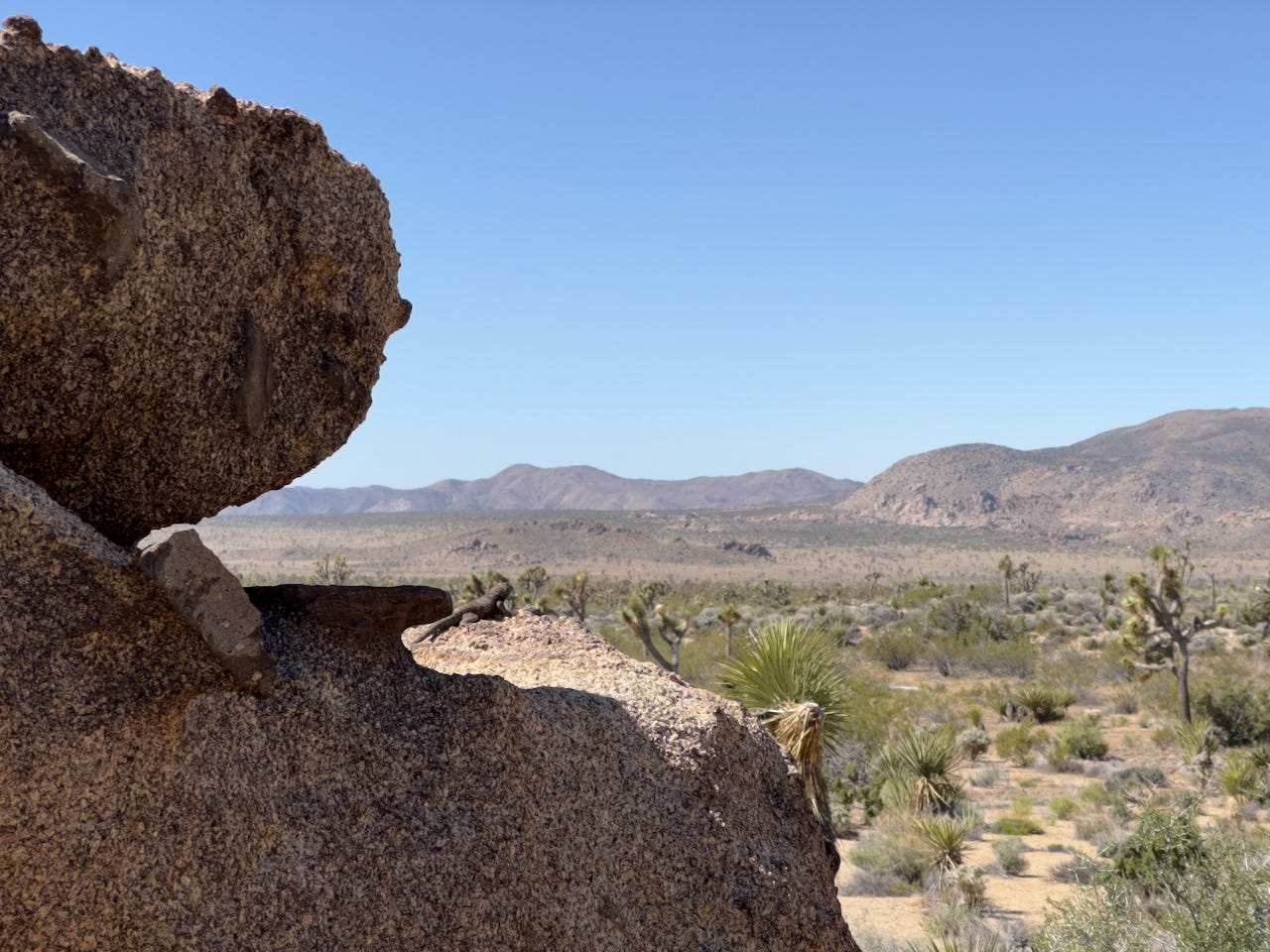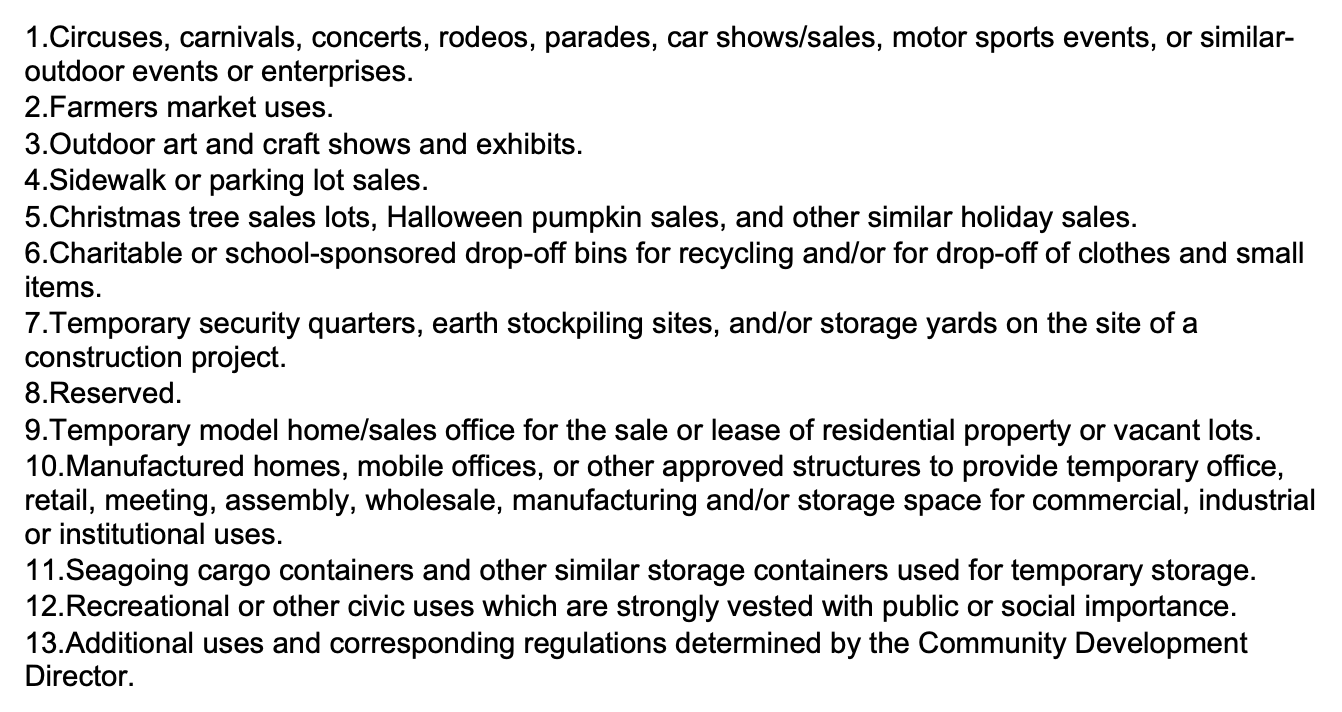ON THE AGENDA: Twentynine Palms Planning Commission, May 7, 2024
Study sessions on residential Temporary Use Permits, the planning process and unhoused resources are the focus

The next City of Twentynine Palms Planning Commission meeting will be at City Hall this Tuesday, May 7, at 5 pm.
The agenda packet can be found on the City’s website, which will also have a livestream link for watching at home on the day of the meeting. The recording will be available for viewing later on YouTube. As usual, we are covering the highlights. Note: the only Consent Calendar items are minutes from previous meetings.
PUBLIC COMMENT
After Planning Commission announcements, you can comment on items not on the agenda. Public comments on agenda items will be requested when the item is discussed. Fill out a green comment sheet for public comments or agenda item comments and hand it to the staff, usually sitting at the desk at the front of the room on the right side. You have three minutes to make your comments.
You may also email comments to Planning Commission members and Keith Gardner, the Community Development Director, and request that comments be read at the meeting.
Why these study sessions now?
The Desert Trumpet inquired whether there was anything happening in the community prompting the Planning Commission to conduct study sessions on temporary use permits in residential zoning, the Circulation Element in the General Plan, and the authority of the Planning Commission at this particular time. Community Development Director Keith Gardner replied:
As far as the workshop on temporary events in residential areas, we have had instances come up quite often where we get requests for events on private residential property, but the Development Code does not address this situation. So, I’m proposing some <hopefully> clear guidelines. When I’m dealing with administrative / interpretive decisions like this, I prefer to do it in a public forum.
After the last Planning Commission, I asked each Commissioner if it would be beneficial to them to have workshops on particular topics pertaining to the planning and permitting process. Each Commissioner expressed an interest in having these workshops. The two topics that are on the agenda for next week are the topics that I was asked to discuss. Depending on the will of the PC, we may cover more topics in the future.
STUDY SESSIONS
Workshop on Temporary Use Permits (TUPs) in Residential Areas
When should a “seasonal or annual” event “on private residential property” be required to pull a permit? Planning staff are asking for input from the Planning Commission on whether occasional events that sell alcohol, are ticketed, and/or involve the closing of roads or traffic control justify a TUP.
Currently, TUPs are $146.45 for private property and $346.18 for public property.
However, the current list of temporary events requiring a TUP includes several items unlikely in residential areas.
Per the staff report, the City has “been approached about other potential activities in residential areas such as weddings, art shows, estate sales, and political fundraisers.” Rather than listing specific types of events, staff is wondering whether establishing minimum thresholds for TUPs, such as charging for tickets or alcohol, might be advisable. However, Gardner adds, "It is not Staff's intention to require permits for every private event.”
Workshop on the Planning Process
From the staff report:
From time to time, it may be beneficial to the Planning Commission and/or the members of the Public to be reminded on the rules, policies, and procedures that the Community Development Department has to implement.
Two topics are being covered in in the study session: the “authority of the Planning Commission” and “hierarchy of the road system in the Circulation Element of the General Plan.”
Authority of the Planning Commission
With regards to the first topic, the staff report includes the code establishing the Planning Commission, which defines their mission as:
to protect and promote the public health, safety and welfare of the citizens of Twentynine Palms; implement the goals and objectives of the General Plan in guiding future growth of the City; safeguard and enhance the appearance and quality of development of the City; and protect the physical, social and economic stability resulting from comprehensive and orderly planned development.
Residents have sometimes questioned how much planning the Planning Commission engages in and whether the body is more reactive than proactive in protecting ”public health, safety and welfare” or ensuring “orderly planned development.” Hotelier Veno Nathraj has pointed out that there has been frequent waiving or deferring of requirements such as the scale of landscaping or the under-grounding of utilities.
Planning Commission members serve four-year terms and must apply for reappointment. However, despite numerous applications for their positions, sitting members are usually reappointed. Commissioners Jim Krushat and Leslie Paahana’s current terms expire in April 2025 (both were first appointed in 2017), and the remaining Commissioner’s terms expire in 2027.
The Circulation Element
In recent meetings on the Ofland resort in Indian Cove and the solar farm off Two Mile Road, members of the public have expressed confusion over the required upgrading of roads from dirt to paved—this was discussed briefly at the last Planning Commission meeting but is also addressed in the Circulation Element attached to this meeting’s staff report.
The Circulation Element contains a series of maps that residents might find useful —including a master circulation plan, maps for scenic highways, truck routes, military convoy routes, and airports. These maps project street development and use into the future. If you have questions about the differences between collector, secondary and arterial roads, this is likely the time to find the answers.
Workshop on Housing and Homeless Committee Resources
The Housing and Homeless Committee has been working on a list of resources for several months and a draft of that list is included in the report for discussion. Included are 20 organizations, three of which are religious. The list includes the type of organization, the phone number, hours of operation and the types of services offered.
These three topics cover a lot of ground, but these sessions offer an opportunity for residents to better understand their Department of Community Development, the Planning Commission and the types of issues they confront.
Share your thoughts in the comments below. Please note that we do not allow anonymous comments. Please be sure your first and last name is on your profile prior to commenting. Anonymous comments will be deleted.
Share this article—it’s free!
Desert Trumpet subscriptions are always free—but thanks to our paid subscribers, we raised $2,390 toward our first-quarter goal! We hope to raise $2,500 in our second quarter. Paid subscriptions are just $5 a month or $50 per year.
We also accept donations of $100 or more through Paypal! Please note that your subscription/donation will be listed as AHA Projects, the name of our fiscal receiver, on your statement.




